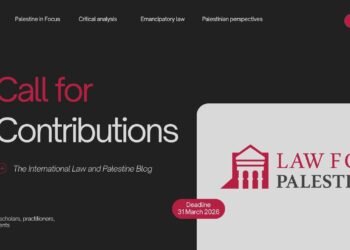The Covid-19 Vaccine Enterprises Responsibility to ensure no discrimination is practiced by Israel against Palestinians : A Reading in Light of the United Nations Guiding Principles on Business and Human Rights
By: Hiba B’irat & Hassan Ben Imran
Editor: Ihsan Adel
Introduction
While Israel is taking the lead globally in providing vaccine for its citizens with a percentage of 50% receiving two doses, it totally neglects its duties as an occupying power towards the occupied Palestinian people. According to the World Health Organization there were almost 205 thousand new cases in the Occupied Palestinian Territories (West Bank including Jerusalem, and Gaza Strip), while the number of death toll reached about 2,227, according to latest updates of Palestinian Ministry of Health on February 26, 2021.
On the other hand, Israel, with a population slightly less than 9 millions, gave the first dose of vaccine to 4.6million citizens, 3.2 millions of which took the second dose. Nonetheless, Israel did not provide vaccines to the 4.6 million Palestinians, languishing under its occupation in the West Bank and Gaza Strip. Only 2000 doses of vaccine were given, out of 5000 that Israel promised to provide for the Palestinian Authority.
Israel’s Responsibility for Providing Vaccine to Palestinians
The above mentioned statistics raise a serious question on how committed, or rather uncommitted; Israel is, to its responsibilities as an occupying power. Israel claims, based on Oslo Accord, that Palestinians are responsible for their own health.
This is simply not true, United Nation experts clearly say that International Law has the priority over such agreements. Fourth Geneva Convention concerning the protection of civilians in time of war of 1949, is clear about the obligation of the occupying state to provide health care for occupied people under its control. Article (55) of the Convention stated that the responsibility of providing “medical supplies” for the people under occupation rests with the occupying state.
Also, under article 43 of Hague Rules of 1907, Israel is obligated to protect the civil life of Palestinians as an occupying power. Based on the clarification of the Israeli high court; this concept includes health.[1]
Moreover, it was mentioned in Oslo Accords that Israel and Palestine will exchange information regarding pandemics and infectious diseases, and will cooperate in combating them.
Several human rights organizations emphasized that if the Palestinian Authority (PA) is incapable or unwilling to provide Covid-19 vaccines for its people, or if it implements vaccination in such a manner not in line with the standards of international practice, then Israel will eventually remain responsible for providing the vaccines. To put it differently, if Israel is capable of providing vaccines before the PA is, or if it is capable of providing better vaccines (in terms of quality, safety, or effectiveness based on the standards of the International Health Organization, then it is obligated to do so.
Moreover, Israel is obligated according to the non-discriminatory rules deeply rooted in International Law not to practice discrimination between Israelis and Palestinians. Based on this, Israel is unable to prioritize its people over the people it occupies in terms of providing the vaccine. Some legal experts consider that the lack of proper care and attention by the Israeli occupation authorities towards the Palestinians during the pandemic, may amount to a war crime.
This legal position regarding Israel’s responsibility to provide vaccines to Palestinians not only was the position of well-known human rights organizations such as Human Rights Watch and Amnesty International, but also was the official position of special rapporteur of the United Nations on the situation of human rights in the Palestinian Territory occupied since 1967 Mr. S. Michael Lynk who emphasized in a statement the Israeli responsibility in this matter, and its preliminary approach to violate this obligation.
Vaccine Apartheid!
Recently, dozens of organizations signed a statement that describes the way of distributing the vaccine by Israel as “discriminatory, illegal, and racist”. This might be true especially since Israel provides its population, including those who live in the settlements that spread in the West Bank and East Jerusalem, with vaccines while preventing them from Palestinians who live nearby in the same place!
To illustrate, an 18 years old Israeli living in one of the settlements in the West Bank will get the vaccine, because he is an Israeli. On the other hand, his Palestinian neighbor, who is 85 or 90 years old living 10-meters-away from him, will not get it.
Discriminating based on ethnic or religious identity, especially in distributing a life saving vaccine, is a dangerous violation of the right to non-discrimination. These practices involve elements of the Apartheid crime, which is identified by the second paragraph of Article (7) in Rome Statue that established the International Criminal Court (ICC) in 2002 as “inhumane acts of official institutions in the context of systematic oppression and domination by racial group over any other racial group in the intention of maintaining that regime.” Undoubtedly, it is not possible to describe a system that provides a vaccine, which is a life saver today, especially for the elderly, for its population while preventing those whom are under its control for decades from the same advantage in any way other than a system of Apartheid. On this part, and based on the aforementioned article, this crime is within the ICC’s territorial jurisdiction, the Pre-trial Chamber of which has recently issued a decision with regards to its jurisdiction over the occupied Palestinian territories.
The responsibility of the companies that Israel contracted with to ensure non-discrimination in distributing vaccines to the Palestinians
While Israel is responsible for respecting the Palestinians’ rights before the ICC, medicine companies and vaccine suppliers are not exempted from being responsible for examining the violation of such rights in distributing vaccines.
Israel signed at the end of the last year and at the beginning of this year contracts with “Pfizer” company to provide 10 million vaccines, it also signed contracts with “Moderna” company to provide almost 6 million vaccines, and other contracts with “AstraZeneca” company to provide another 10 million vaccines.
If it is proved that these commercial entities that Israel contracted with to provide vaccines were directly or indirectly involved in reinforcing the current situation through contributing to the discriminating impact; International Humanitarian Law and International Law for Human Rights will not keep them isolated from being responsible in this matter.
According to the UN Guiding Principles on Business and Human Rights entitled “Protection, Respect, and Remedy”, which was unanimously adopted in the Human Rights council session in June 2011, these companies are obligated to respect international rules and human rights embedded in them during implementing their commercial acts, including supplying vaccines.
Paragraph (11) clause (B) in the Guiding Principles states that “Business enterprises should respect human rights”. This means that they should avoid infringing on the human rights of others and should address adverse human rights impacts with which they are involved.” This responsibility exists regardless of the ability of the contracting states, and/or their willingness to fulfill their own human rights obligations.
Paragraphs (12), (13), (14), and (18) dealt in detail with the restrictions and methods of investigating these rights in accordance with international conventions and general principles of international law. Paragraph (12) obligates the commercial enterprises to respect the body of human rights, which includes, at its minimum, the International Bill of Human Rights and the principles concerning the basic rights stipulated in the declaration of the International Labor Organization regarding principles and basic rights at work.
The commentary on paragraph (12) of the mentioned guiding principles, published by Office of the United Nations High Commissioner for Human Rights, affirmed a further responsibility to investigate by the commercial enterprises during exceptional situations, where human rights are under greater threat. Some of these situations are armed conflicts, in which commercial enterprises are obligated to consider the rules of International Humanitarian Law, in addition to the rules of the International Human Rights Law.
The Guiding Principles also affirmed in its preamble that they shall be implemented in a non-discriminatory manner, with particular attention to the rights, as well as the challenges faced by, individuals from groups or populations that may be at a higher risk of becoming vulnerable or marginalized. In this matter, we mention the numerous United Nations reports, such as; but not limited to, the UN Common Country Analysis (CCA), statements by special rapporteurs, UN Women, OCHA, UNCTAD, and the International Food Organization, which emphasized in several occasions the necessity of providing protective care for Palestinians as a neglected and vulnerable group following the Corona pandemic, and even in other situations that were less burdensome.
What is the Responsibility of the vaccine enterprises regarding the Israeli Discrimination in Distributing the Vaccines among Palestinians?
Paragraph (13) of the Guiding Principles On Business and Human Rights regarding the responsibility of the business enterprise deals with this question in detail. The paragraph precisely states the business enterprise obligation to:
“(a) Avoid causing or contributing to adverse human rights impacts through their own activities, and address such impacts when they occur;
(b) Seek to prevent or mitigate adverse human rights impacts that are directly linked to their operations, products or services by their business relationships, even if they have not contributed to those impacts.
This article undoubtedly clarifies that the responsibility of the enterprises exceeds a direct violation of human rights to include avoiding inflicting the impact and ensuring the purchases will not be used in violating human rights. In the commentary of this paragraph, it was emphasized that the responsibility of the enterprise is not only limited to its activities, but also to what it “ignores/neglects”; which includes, its negligence of human rights obligations of its clients.
The responsibility of the enterprises exceeds a direct violation of human rights to include avoiding inflicting the impact and ensuring the purchases will not be used in violating human rights
Paragraph (18) details the procedures that the business enterprise shall follow in order to either prevent the cause, or prevent contributing to the negative impact, or mitigate it in the event it occurs. According to the paragraph, the enterprises incurs financial liability to address this impact. Moreover, paragraph 19 indicates that the liability for the company is determined by “the extent of its power in addressing the negative impact.”
Add to that, local laws in headquarter countries of vaccine manufacturers and distributers obligate these enterprises to respect the mentioned Guiding Principles. For example, in the United States, where Pfizer and Moderna are located, the instructions of the US Department of State’s Bureau of Democracy and Human Rights clearly state that American companies are under the obligation to respect human rights in their local and international activities and in accordance with the Guiding Principles of the United Nations. On the other hand, the recommendations of the European Council of Ministers CM/Rec (2016) 3 , applicable to both “BioNTech” the German enterprise partner to Pfizer and the British- Swedish “AstraZeneca”, also refer to the Guiding Principles and to the obligation of ensuring and respecting the right to non-discrimination.
The principle of non-discrimination is a general principle that is deeply rooted in the conventions and principles of International Law, including in the first article of the International Declaration of Human Rights and the second article of the International Covenant on Civil and Political Rights, not to mention the specialized conventions such as the Convention on the Elimination of All Forms of Discrimination and the International convention on the Suppression and Punishment of the Crime of Apartheid.
In the more specific “Human Rights Guidelines for Pharmaceutical Companies in relation to Access to Medicines”, which were prepared by the special rapporteur on the Right to Health, he clarifies that equality and non-discrimination are considered “the basic characteristics of international human rights, including the right for everyone to the enjoyment of the highest attainable standard of health.” Emphasizing on the importance of this principle, nine of human rights experts affirmed in a statement the importance of “the universal access to vaccines” with no discrimination based on race or else wise. The statement considers this matter a joint responsibility among states, enterprises, and all contributors.
It is worth mentioning here that Pfizer pledged to respect human rights through signing the Ten Principles of the UN Global Compact. According to which, enterprises pledge not to violate human rights. Moreover, Pfizer, in its internal policy statement, published on its website, is committed to adopting the Guiding Principles of the UN in particular, and the conventions of human rights, including its pledge not to discriminate in distributing its purchases. Both “BioNTech” and “AstraZeneca” adopted similar obligations. This can be shown in BioNTech policy statement related to human rights, and “AstraZeneca”, which affirmed that their contractors shall also pledge to respect human rights.
There under, there is an obligation on the enterprises that supply Covid vaccines to Israel, particularly “Pfizer”, its partner “BioNTech”, “Moderna”, and “AstraZeneca” to ensure that there is no discrimination practiced by their customers in distributing the vaccines among their citizens and the people under their control. This includes Israel.
The enterprises shall investigate boundaries of respect to the principle of equality and non-discrimination in distributing the vaccine to the Palestinians, and use its power and Israel’s urgent need for the vaccine to ensure such respect
Enterprises can implement this obligation by stipulating it in their supply contracts with Israel, under the penalty of termination in case of breach. These enterprises shall investigate boundaries of respect to the principle of equality and non-discrimination in distributing the vaccine to the Palestinians, and use its power and Israel’s urgent need for the vaccine to ensure such respect, in accordance with paragraph 19 of the guidelines, to which we previously referred.
The consequence of enterprises failing to fulfill their responsibilities to ensure non-discrimination
Paragraph (22) of the UN Guiding Principles on Business states that “Where business enterprises identify that they have caused or contributed to adverse impacts; they should provide for or cooperate in their remediation through legitimate processed”, while paragraph (29) obligates enterprises to identify effective grievance mechanisms for the advantage of victims.
In the Human Rights Council’s Resolution 31/36 for the year of 2016, the council emphasized on the obligation of implementing the Guiding Principles on Business and Human Rights in the Occupied Palestinian Territories. This includes states’ obligation to take appropriate measures to ensure that enterprises will not practice gross violation to human rights in Palestine or contribute to committing it. The resolution requested the United Nations High Commissioner for Human Rights to prepare a list of business enterprises involved in activities related to Israeli settlements in Palestine. The list was certainly released four years later, and included 112 business enterprises. These entities interestingly included “Airbnb”, “Expedia” and “Tripadvisor”, civilian companies that provide services such as accommodations and travelling. However, the association of such services with the promotion of human rights violations urged their inclusion in the aforementioned list.
Based on an analysis published by The International Committee of the Red Cross (ICRC) and entitled “COVID-19 vaccines and IHL: ensuring equal access in conflict-affected countries”, it can be concluded that the Israeli racist policy in distributing the vaccine among its citizens and preventing the Palestinians from it is a violation of International Humanitarian Law and International Human Rights Law. This could amount to a war crime, in addition to it falling under the crime of Apartheid, and both are within the jurisdiction of the ICC. Therefore, commercial enterprises that cooperate with the current situation and do not mitigate the negative impact to which they have contributed, risk tarnishing their reputation by participating in crimes that are subject to accountability by the International Criminal Law, and are structured on a lack of respect for the principle of non-discrimination; one of the basic principles of International Human Rights Law, and International Humanitarian Law.
[1] See Israel’s High Court of Justice, Jam’iatIscan Al-Ma’almoun v. IDF Commander in the Judea and Samaria Area, Judgment, HCJ 393/82, 28 December 1983, para. 18.
Keywords: The Covid-19 Vaccine , Enterprises , discrimination , Israel , Palestinians







